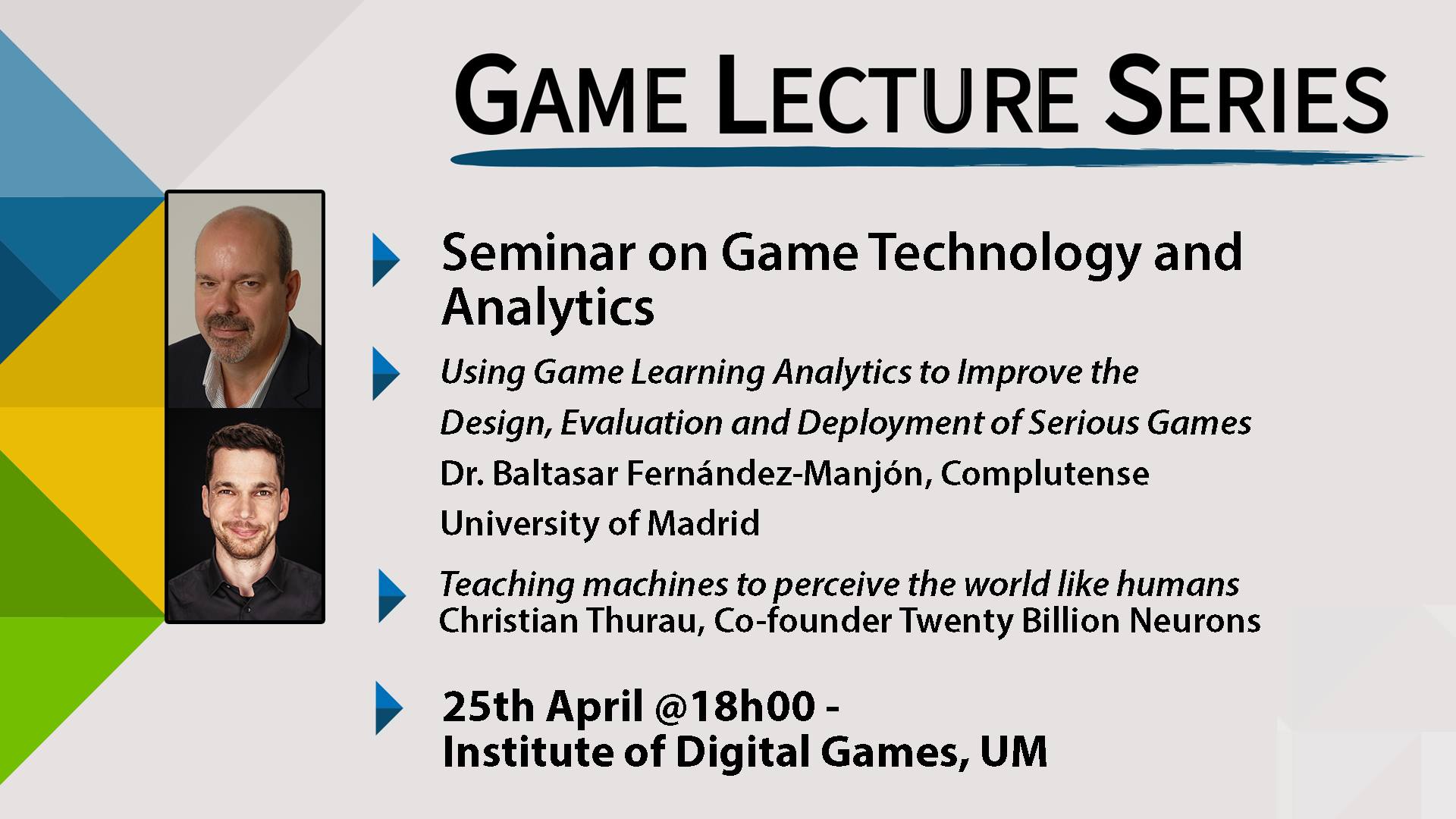
Game Lecture Series: Game Technology & Analytics


Game Lecture Series - Game Technology and Analytics Seminar - 25th April 18h00 @ Institute of Digital Games
Game Lectures are held approximately once a month at the IDG and are public, open, free events on weekday evenings which bring together academics, practitioners and enthusiasts with a common love for games of any type: digital, analog, urban, free-form, etc.
About the talk:
This Game Lecture is a Game Seminar where we will have two 30 minute talks:
1. Using Game Learning Analytics to Improve the Design, Evaluation and Deployment of Serious Games by Dr. Baltasar Fernández-Manjón is a full professor in the Department of Software Engineering and Artificial Intelligence (DISIA) at the Complutense University of Madrid (UCM).
and
2.Teaching machines to perceive the world like humans by Christian Thurau, Co-founder Twenty Billion Neurons
About - Using Game Learning Analytics to Improve the Design, Evaluation and Deployment of Serious Games
Game Learning Analytics (GLA) is the process of applying Learning Analytics techniques to Serious Games in order to get insight about how the game is being used and improve the educational experience. In this talk we will present the general ideas about the GLA and provide details about the GLA supporting framework and some of the experiences done on H2020 EU projects RAGE and BEACONING and in cooperation with the Telefonica-Complutense Chair on Digital Education and Serious Games.
About - Teaching machines to perceive the world like humans
At Twenty Billion Neurons, they believe that the next breakthrough in Computer Vision will concern video understanding. The vast majority of commercial use cases in video understanding are stretching the envelope of what current technology is capable of. The reason is, that machines today are missing a common-sense understanding of the real world. We humans constantly rely on our innate ability to understand and make inferences about our environment as we navigate the physical world. Our common-sense reasoning is built up through lifelong experience, beginning in early childhood and extending well into adulthood. In this talk, Christian will explain their approach to Computer Vision and how it could enable machines that perceive the world like humans.
About Baltasar:
Dr. Baltasar Fernández-Manjón is a full professor (catedrático) in the Department of Software Engineering and Artificial Intelligence (DISIA) at the Complutense University of Madrid (UCM). Dr. Fernández-Manjón has been the Vice Dean of Research and Foreign Relationships at the Computer Science School of this university (2006-2010). In 2010-2011 he has been Visiting Associate Professor at Harvard University and Visiting Scientist at LCS-MGH. He leads the Complutense e-learning research group <e-UCM>. He is IEEE Senior Member. He is the former Academic Director of the Computer Science School of Centro de Estudios Superiores Felipe II (Aranjuez, Spain) (2001-2006). He is involved in different EU projects (e.g. H2020-RAGE, H2020-BEACONING, GALA, SEGAN, CHEMURG) and other projects about technology transfer with industry (INDRA, ATOS, CEPAL, Germinus XXI, Technosite-ONCE).
He also act as R&D evaluator and reviewer for the European Commission (i.e. IST, eContentPlus, ETEN) and Spanish research programmes (e.g. ANEP, ACAP, ANECA). web site http://www.e-ucm.es
About Christian:
Christian is an entrepreneur and A.I. researcher with 15 years of experience. He is co-founder of Twenty Billion Neurons, a Berlin and Toronto based A.I. and Deep Learning startup. In 2011, he also co-founded the Big Data startup Game Analytics, which was later acquired by Mobvista. He holds a PhD in Machine Learning and has published more than 50 scientific papers on a broad range of topics including Computer Vision, Data Mining, Pattern Recognition, and Game Analytics. He is a Marie Curie fellow of the EU and held research positions at the Center for Machine Perception in Prague and the Fraunhofer Institute for Intelligent Analysis and Information Systems in Bonn among others. Christian is an advisor for AI for the Expert Commission for Research and Innovation (EFI) of the Federal Republic of Germany and the Konrad-Adenauer Foundation.

